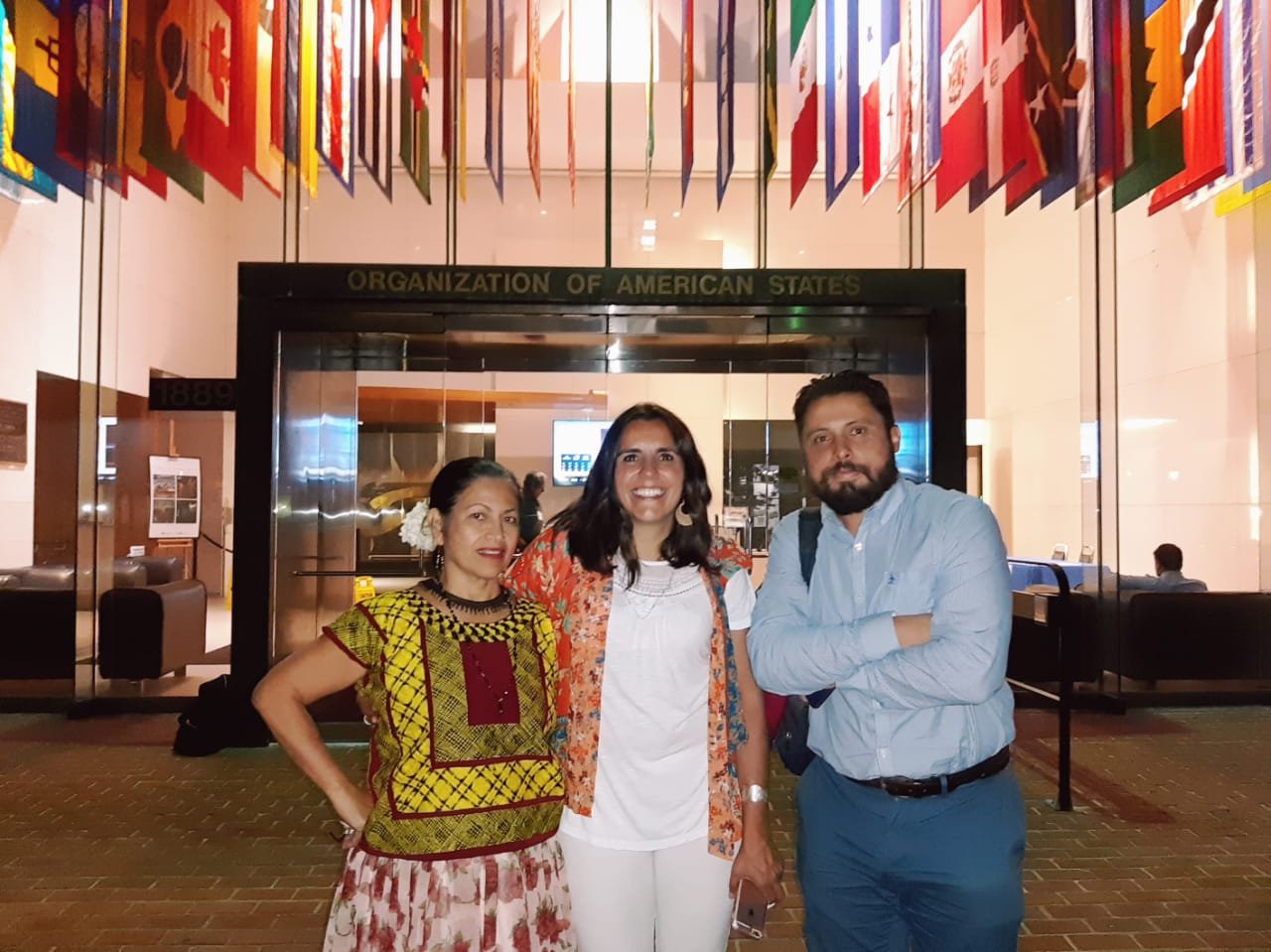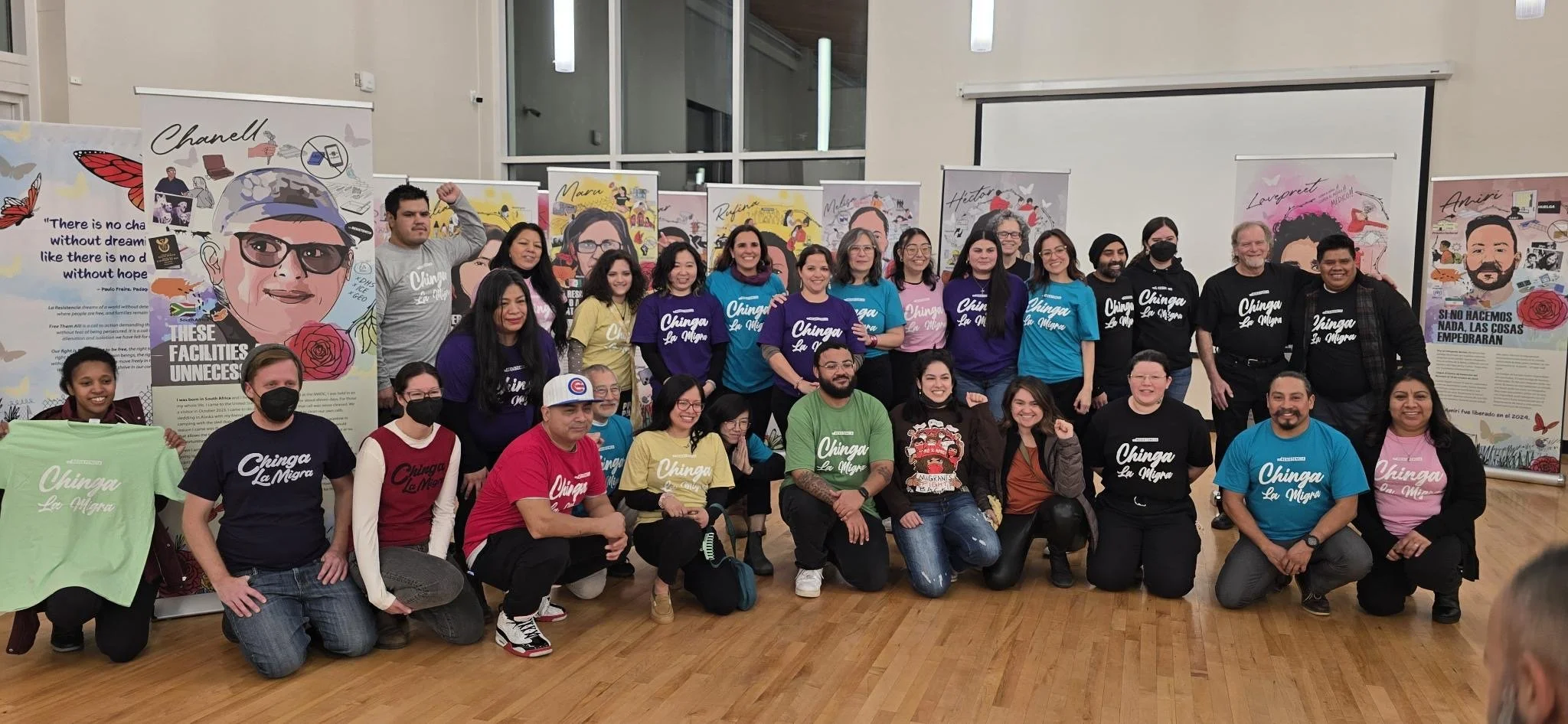Episode 20: Criminalization of Immigration — The Power of Grassroots Organizing and Storytelling
In Episode 20 of Art of Citizenry Podcast, Manpreet Kaur Kalra is joined by immigrant community organizer Maru Mora-Villalpando, Founder of La Resistencia, and international human rights lawyer Alejandra Gonza, Executive Director of Global Rights Advocacy. Together, they expose the brutal realities of immigration detention—from systemic neglect and punishment to the resilience of those organizing from within its walls. Maru shares how La Resistencia mobilizes communities to challenge deportations and support detainee-led organizing at Northwest Detention Center. Working in direct collaboration, Alejandra sheds light on the intersection of international human rights law and grassroots advocacy, emphasizing the role of storytelling in holding systems accountable. Through the Melting Ice Project, they document the lived experiences of detained migrants, ensuring their stories shape the fight for justice. This episode is a call to action: migrants in detention are not passive victims—they are organizing, resisting, and demanding change. Join us as we explore the power of community-led movements, storytelling as an advocacy tool, and the role of international human rights mechanisms.
Meet Our Guests
Maru Mora-Villalpando is a longtime immigrant and community organizer dedicated to the fight for immigrant justice. She is the Founder and Advisor of La Resistencia, an immigrant-led grassroots organization working to shut down the Northwest Detention Center in Tacoma, Washington, and end all detentions and deportations in the state. Maru’s work embodies the power of grassroots organizing, direct action, and collective resistance. Through La Resistencia, she has helped mobilize communities, support detainee-led hunger strikes, and challenge the injustices of the immigration system.
La Resistencia plays a crucial role in amplifying the voices of those directly impacted by the immigration enforcement system. It remains the only organization in Washington State led by individuals targeted by detention and deportation, ensuring that advocacy efforts are driven by the people most affected.
During our conversation, Maru discusses the heightened risks and systemic obstacles that undocumented activists encounter, including surveillance, intimidation, and the constant threat of deportation. Despite these challenges, she emphasizes the importance of grassroots organizing and community solidarity in advocating for immigrant rights and dismantling oppressive systems.
The system is structured to silence us—but we refuse to be silent.
—Maru Mora-Villalpando
Alejandra Gonza is an Argentinian human rights lawyer. She is the Founder and Executive Director of Global Rights Advocacy, a Seattle-based non-profit providing pro-bono representation at international bodies. She focuses on defending the right to freedom of undocumented immigrants at the Northwest ICE Processing Center, as well as environmental defenders, political prisoners, and those wrongfully convicted abroad. Alejandra's experience as the daughter of a political prisoner who disappeared under Argentina's dictatorship drives her commitment to community lawyering, ensuring families don't face such tragedies alone, as her mother did. She believes in the power of storytelling to empower individuals to build their own reparation framework.
Global Rights Advocacy is on a mission to provide victims access to international human rights mechanisms through high quality legal defense and advocacy strategies. GRA has also been doing incredible work in documenting the testimonies of detainees at Northwest Detention Center for the past ten years.
During our conversation, Alejandra discusses the importance of documentation and storytelling as a tool for human rights advocacy. By centering the voices of those most impacted, GRA’s documentarian work is a call to action, a demand for justice, and a reminder that resistance persists—even in the darkest corners of the immigration system. As an expert in international human rights law, she breaks down the two primary mechanisms used in her effort to ensure accountability, the International Human Rights Commission precautionary measures and United National special procedures.
Detention centers are not about safety or justice—they are about profit and control. When the system is built to oppress, international human rights law becomes a tool to fight back.
—Alejandra Gonza
Melting ICE Exhibit
Melting ICE is a visual storytelling project done in collaboration between La Resistencia, Global Rights Advocacy and UW Tacoma that artfully humanizes a problem that often dehumanizes individual narratives – allowing the people most impacted to guide the storytelling process. The exhibition serves as both an artistic and political intervention, engaging the practice of storytelling as an act of living resistance to the oppressive conditions of immigrant detention.
Storytelling can empower individuals to build their own reparation framework.
—Alejandra Gonza
Grassroots Movements
Grassroots movements are crucial in the fight for justice – amplifying the voices of directly impacted communities and challenging unjust policies and systems through collective action. These movements mobilize local resources while holding governments and private actors accountable. Unlike larger, institutionalized organizations, grassroots movements are deeply embedded in affected communities, allowing them to respond swiftly to injustices and amplify the voices of those directly impacted. By centering lived experiences and nurturing solidarity, grassroots organizations create sustained pressure, ensuring that immigrant rights remain a priority in public discourse and legislative agendas.
Migrants in detention are not passive victims—they are resisting, organizing, and demanding change.
—Maru Mora-Villalpando
Grassroots organizers face significant challenges, including limited funding and resources. Additionally, it is not uncommon for activists to face political and legal barriers, such as surveillance or criminalization, in order to suppress dissent. Despite these challenges, grassroots movements remain essential for driving systemic change and holding institutions accountable.
Take Action
The work of grassroots organizations is crucial. They amplify the voices of those inside, mobilize advocates, and challenge the policies that uphold violent institutions. But they cannot do it alone. True solidarity means more than just awareness—it requires action. Support grassroots groups doing this work in your neighborhood and donate to mutual aid funds. If you decide to get involved in the fight for immigrant justice, follow the lead of those already doing the work, and use your skills and resources to support their demand for an end to detention as a tool of oppression.
Grassroots Organizations & Partners Fighting for Immigrant Justice
La Resistencia is a grassroots organization led by undocumented immigrants and people of color who have been oppressed by the immigration enforcement system in Washington State.
Tsuru for Solidarity is a nonviolent, direct action project of Japanese American social justice advocates working to end detention sites and support front-line immigrant and refugee communities.
Global Rights Advocacy offers access to international human rights mechanisms through representation, reporting and education.
Northwest Immigrant Rights Project promotes justice by defending and advancing the rights of immigrants through direct legal services, systemic advocacy, and community education.
Detention Watch Network brings together advocates to unify strategy, build partnerships and strengthen the movement to end immigration detention.
Resources
Immigration Know Your Rights Resources - double-sided posters you can print out.
Know Your Rights Resource in Punjabi - guidance in both English and Punjabi, including red-cards that can be downloaded and printed.
National Immigration Legal Services Directory - Search for immigration legal services providers by state, county, or detention facility. Only nonprofit organizations that provide free or low-cost immigration legal services are included in this directory.
Download & Print a Red Card - Immigrant Legal Resource Center’s Red Cards help immigrants exercise those rights and protect themselves in many situations, such as when immigration agents visit our homes. Available in 16 different languages.
ACLU Know Your Rights - Regardless of your immigration status, you have guaranteed rights under the Constitution. Learn more here about your rights as an immigrant, and how to express them.
The National Immigration Project - a membership organization of attorneys, advocates, and community members that litigate, advocate, educate, and build bridges across movements to ensure that those who are impacted by America’s immigration and criminal legal systems are supported.
Know Your Rights: For Employers & Community Businesses - Workplace raids are a common immigration enforcement tactic, often targeting industries reliant on immigrant labor, such as agriculture and food service.
References + Additional Links
Conditions at the NWDC: Reporting of Sexual Abuse and Assault - Report by Uniersity of Washington Center for Human Rights
Conditions at Northwest Detention Center - Report by Uniersity of Washington Center for Human Rights
Become a Patron
Art of Citizenry is proudly independent. This allows us to speak with raw honesty about the ways people, brands, and organizations perpetuate colonial legacies. Here, we embrace the power of nuance and unfiltered truth, believing that meaningful growth emerges when we face complexity head-on. Support us as we critically explore, challenge, and unravel mainstream narratives by empowering listeners with accessible, nuanced perspectives. Your support directly sustains our podcast, helping cover the wages of our dedicated three-person team.
Please consider supporting by visiting: patreon.com/manpreetkalra
To make a one-time contribution, you can do so here: visit.artofcitizenry.com/paypal
Thank You for Listening
Please subscribe and leave a five star review for Art of Citizenry wherever you listen to podcasts.
Also, follow along and share your thoughts on Substack - artofcitizenry.substack.com



